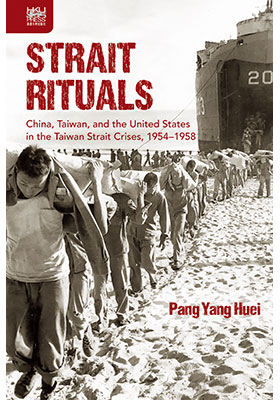Strait Rituals
China, Taiwan, and the United States in the Taiwan Strait Crises, 1954–1958
(海峽儀式:中國、台灣、美國和台海危機,1954–1958)
ISBN : 978-988-8208-30-2
March 2019
336 pages, 6″ x 9″, 4 b&w illus.
- HK$400.00
Ebooks
The two Taiwan Strait crises took place during a particularly tense period of the Cold War. Although each incident was relatively brief, their consequences loom large. Based on analyses of newly available documents from Beijing, Taipei, and Washington, Pang Yang Huei challenges conventional wisdom that claims Sino-US misperceptions of each other’s strategic concerns were critical in the 1950s. He underscores the fact that Washington, Taipei, and Beijing were actually aware of one another’s strategic intentions during the crises. He also demonstrates conclusively that both “crises” can be understood as a transformation from tacit communication to tacit accommodation.
An important contribution of this study is a better understanding of the role of ritual, symbols, and gestures in international relations. While it is true that these two crises resulted in a stalemate, the fact that all parties were able to cultivate talks and negotiations brought relations, especially between the US and China, to a new and more stable level. Simply averting the threat of war was a major achievement.
Strait Rituals is an important micro-history of a significant moment during the Cold War and a rich interpretation of the theoretical use of multiple points of view in writing history. It sets a new standard for understanding China’s place in the world.
“Strait Rituals is a solidly detailed and thoroughly footnoted excursion into a critical stage of Cold War history. Dr. Pang’s exhaustive archival work sets a real standard in the amalgamation of different sources to reevaluate the Taiwan Strait crises in the 1950s, the repercussions of which can still be felt today.” —Hsiao-ting Lin, Hoover Institution, Stanford University
“An excellent book for those interested in the Taiwan Strait crises in the context of the overall history of international affairs in the Asia-Pacific region. The book will prove to be of great value to those interested in the history of the region that is bound to increase in importance in the years to come.” —Akira Iriye, Harvard University
“Dispassionate, balanced, rigorous in the presentation of facts, much drawn from Chinese archival sources, Pang Yang Huei’s work will be indispensable for anyone seeking to understand the issues surrounding this Cold War hangover that continues to trouble contemporary politics across the Taiwan Strait.” —Geoffrey C. Gunn, Journal of Contemporary Asia



